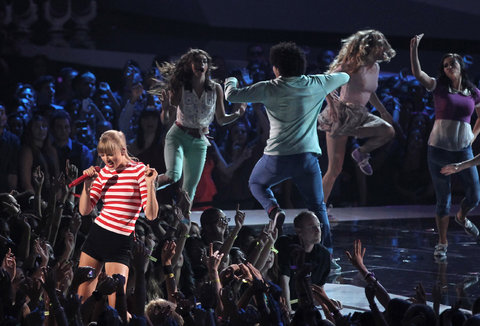 Matt Sayles/Invision, via Assocated Press Taylor Swift performed at MTV’s Video Music Awards last year.
Matt Sayles/Invision, via Assocated Press Taylor Swift performed at MTV’s Video Music Awards last year.
7:52 p.m. | Updated To all the cable customers who have ever wondered, “Why am I paying so much money for channels I never watch?” Cablevision has an answer: it’s Viacom’s fault.
The cable distributor on Tuesday sued Viacom, the owner of MTV and Nickelodeon, saying that the company violated antitrust law by bundling those big channels with barely known ones like Tr3s and Palladia, in that way forcing cable companies and their customers to pay for channels that few people watch.
 Nickelodeon SpongeBob SquarePants, a fixture on Nickelodeon.
Nickelodeon SpongeBob SquarePants, a fixture on Nickelodeon.
The antitrust lawsuit, filed in federal court in Manhattan, may represent a watershed in the debate over “bundling,” or the practice of selling channels to cable and satellite providers in a package. For decades distributors like Cablevision and programmers like Viacom have found it in their best interest to keep the bundle intact, avoiding the “a la carte” idea promoted by public interest groups.
But the two sides are increasingly at loggerheads over the costs as customers’ bills keep rising and when some viewers are turning to the Web for entertainment. Bundling, part of the bedrock of the television industry, is now a potential target.
“This is most interesting as a break between operators and content providers, most of whom have traditionally argued that bundling is good for them, just disagreeing about the price and who controls the bundle,” said Gene Kimmelman, a former Justice Department antitrust lawyer.
In a statement, Cablevision said that “Viacom effectively forces Cablevision’s customers to pay for and receive little-watched channels in order to get the channels they actually want.” In a sign that the issue is larger than just this one dispute, several other distributors — DirecTV, Time Warner Cable and Charter — rallied behind Cablevision after the suit was announced.
Viacom says that, like other programmers, it does not require distributors to bundle all of its channels together; rather the company provides financial incentives to bundle by offering lower prices when smaller channels are grouped together with bigger ones. If a cable operator wants to buy only MTV or Nickelodeon, for example, it has the option to do so at a higher cost per channel.
In a statement Viacom said that it had “long offered discounts to those who agree to provide additional network distribution” and that most distributors viewed these arrangements as “a win-win and pro-consumer.” Federal courts have previously upheld the legality of these arrangements, Viacom said. A person close to Viacom not authorized to discuss the lawsuit for attribution pointed out distributors’ large profits and called the support for Cablevision a public relations stunt.
Cablevision, which is controlled by Charles F. Dolan, said in a statement that the dispute would not result in an immediate disruption in programming, the kind that has become all too familiar to viewers over the years. The company said the lawsuit was filed under seal. A public complaint is expected to be released this week.
Viacom and Cablevision renewed their carriage agreement in December. At the time, no one left the negotiating table with the sense that a lawsuit was imminent, said one person involved in the discussions who would not comment publicly on private conversations. In the statement, Viacom said the lawsuit was a “transparent attempt by Cablevision to use the courts to renegotiate our existing two-month-old agreement.”
This includes the court of public opinion, perhaps. Some customers continue to agitate for the right to pick and choose which channels they receive from distributors on an a la carte basis, while many others say they are content with the buffet of channels they receive now.
Class-action lawsuits against bundling have failed in the courts to date, as did a 2004 case filed by Echo Star that said that Viacom had forced its Dish Network to carry MTV, Nickelodeon and other cable channels in order to carry 18 CBS-owned stations in 15 large media markets. Before the companies settled that case, more than nine million Dish subscribers lost access to MTV and Nickelodeon and 1.6 million lost CBS.
But the lawsuit on Tuesday was different, in that it seemed in part an industrywide effort to both tar Viacom and to portray distributors as pro-consumer and resistant to escalating cable bills, even as they carry out those very same price increases. They have argued for years — more and more loudly of late — that channel owners are the ones requiring them to raise the monthly cost of television service.
In a statement, Time Warner Cable, the second-biggest cable company in the country behind Comcast, said: “We frequently have pointed out that there are serious problems with the current programming environment. We think this lawsuit raises important issues, and we look forward to their resolution in the courts.”
DirecTV agreed, saying, “Our customers have told us time and time again they don’t want to pay for channels they don’t watch.” Charter said the lawsuit sent “a clear message to programmers that unlawful and irresponsible market tactics will not be tolerated.” Dish Network, the second-largest satellite provider behind DirecTV, and Comcast declined to comment.
Among the threats that distributors face are new and possibly cheaper cablelike services delivered by companies via the Internet. Intel has said that it is working on one such service, and other companies are eager to try, as well. If these services, colloquially called “over the top” because they ride on top of existing broadband pipes, succeed, then incumbent cable providers may have to change their own channel packages and pricing to compete.
For the lawsuit to succeed, Cablevision would not only need to prove that bundling harmed customers, but that it hindered competition by prohibiting smaller media companies from obtaining carriage for their channels. Before Cablevision spun off the regional sports channel MSG, it, too, bundled the channel with the less popular MSG2 and MSG Plus.
A version of this article appeared in print on 02/27/2013, on page B3 of the NewYork edition with the headline: Cablevision Sues Viacom in Battle Over Bundling of Channels.
Article source: http://mediadecoder.blogs.nytimes.com/2013/02/26/cablevision-sues-viacom-over-bundling-of-little-watched-channels/?partner=rss&emc=rss